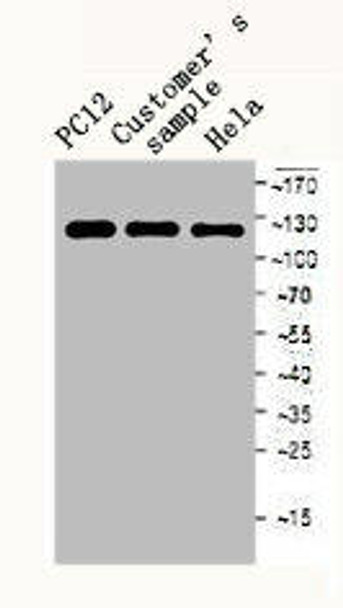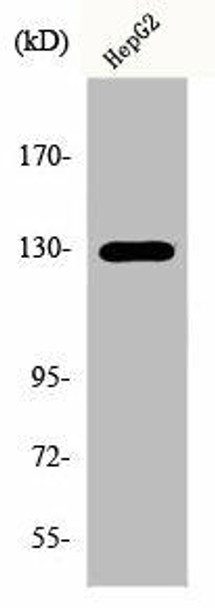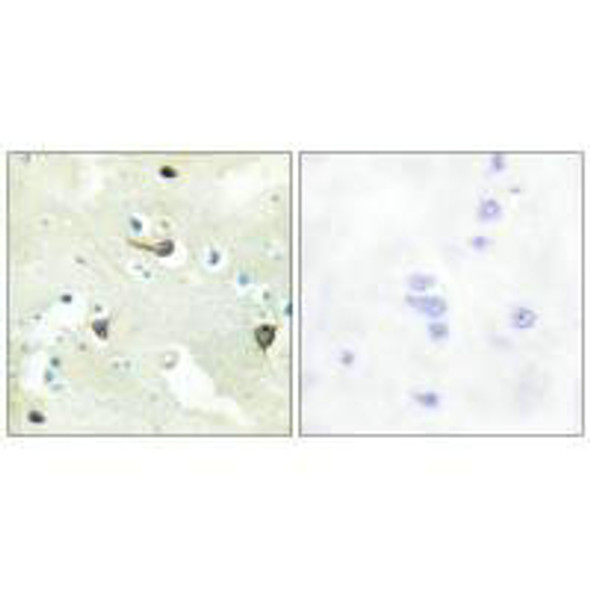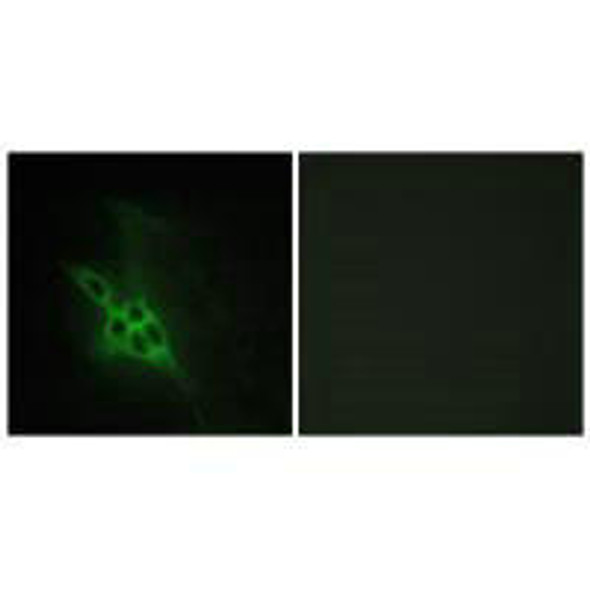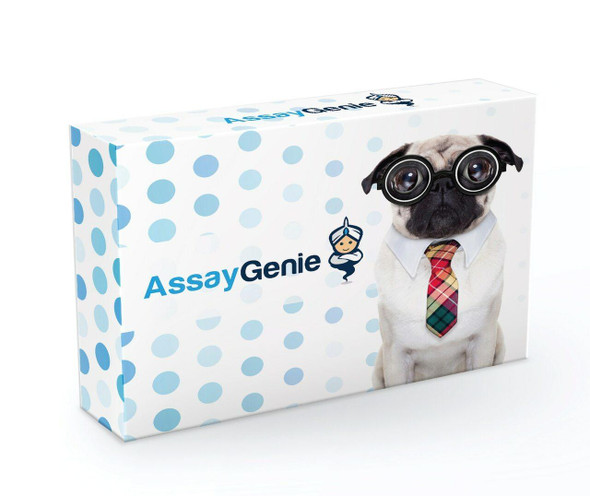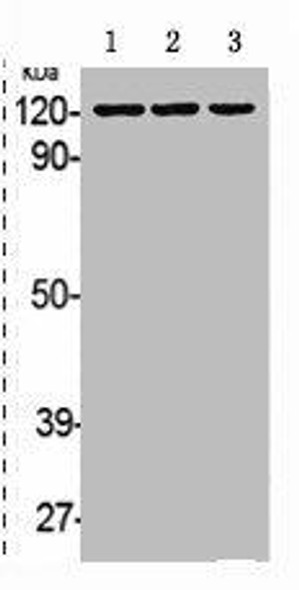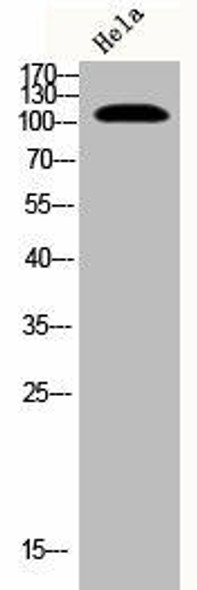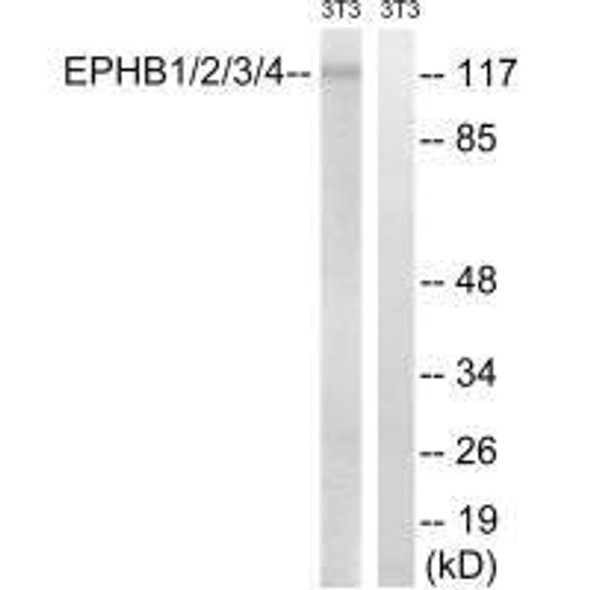Description
EPHB1/EPHB2 Antibody (PACO06466)
The EphB1/EphB2 Polyclonal Antibody (PACO6466) is a valuable tool for researchers studying the EphB1 and EphB2 proteins, important members of the Eph receptor tyrosine kinase family involved in cell signaling and tissue development. This antibody, produced using rabbits, is highly specific to human samples and has been validated for use in Western blot assays. By targeting the EphB1 and EphB2 proteins, researchers can explore their roles in cell communication, migration, and tissue patterning in both normal and diseased states.EphB1 and EphB2 are known to play crucial roles in various cellular processes, including neuronal development, angiogenesis, and tumorigenesis.
Dysregulation of their signaling pathways has been implicated in diseases such as cancer, neurodevelopmental disorders, and cardiovascular diseases. By utilizing the EphB1/EphB2 Polyclonal Antibody, researchers can gain insights into the molecular mechanisms underlying these diseases and potentially identify new therapeutic targets for intervention.Overall, the EphB1/EphB2 Polyclonal Antibody is a valuable tool for researchers seeking to understand the functions of EphB1 and EphB2 in health and disease. Its high reactivity and specificity make it an essential component of studies aiming to unravel the complexities of Eph receptor-mediated signaling pathways.
| Antibody Name: | EPHB1/EPHB2 Antibody (PACO06466) |
| Antibody SKU: | PACO06466 |
| Size: | 50ug |
| Host Species: | Rabbit |
| Tested Applications: | ELISA, WB, IHC, IF |
| Recommended Dilutions: | ELISA:1:40000, WB:1:500-1:2000, IHC:1:100-1:300, IF:1:200-1:1000 |
| Species Reactivity: | Human, Mouse, Rat |
| Immunogen: | Synthesized peptide derived from human EphB1/2 around the non-phosphorylation site of Y594/604. |
| Form: | Liquid |
| Storage Buffer: | Liquid in PBS containing 50% glycerol, 0.5% BSA and 0.02% sodium azide. |
| Purification Method: | The antibody was affinity-purified from rabbit antiserum by affinity-chromatography using epitope-specific immunogen. |
| Clonality: | Polyclonal |
| Isotype: | IgG |
| Conjugate: | Non-conjugated |
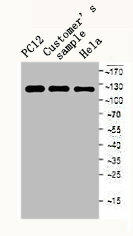 | Western Blot analysis of NIH-3T3 VEC cells using EphB1/2 Polyclonal Antibody. |
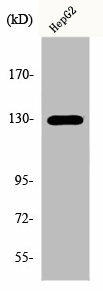 | Western Blot analysis of HepG2 cells using EphB1/2 Polyclonal Antibody. |
| Synonyms: | EPHB1; ELK; EPHT2; HEK6; NET; Ephrin type-B receptor 1; ELK; EPH tyrosine kinase 2; EPH-like kinase 6; EK6; hEK6; Neuronally-expressed EPH-related tyrosine kinase; NET; Tyrosine-protein kinase receptor EPH-2; EPHB2; DRT; EPHT3; EPTH3; ERK; |
| UniProt Protein Function: | EphB1: a receptor tyrosine kinase of the Eph family. Receptor for members of the ephrin-B family: ephrin-B1, -B2 and -B3. The Eph receptor tyrosine kinase family, the largest in the tyrosine kinase group, has fourteen members. They bind membrane-anchored ligands, ephrins, at sites of cell-cell contact, regulating the repulsion and adhesion of cells that underlie the establishment, maintenance, and remodeling of patterns of cellular organization. Eph signals are particularly important in regulating cell adhesion and cell migration during development, axon guidance, homeostasis and disease. EphA receptors bind to GPI-anchored ephrin-A ligands, while EphB receptors bind to ephrin-B proteins that have a transmembrane and cytoplasmic domain. Interactions between EphB receptor kinases and ephrin-B proteins transduce signals bidirectionally, signaling to both interacting cell types. Eph receptors and ephrins also regulate the adhesion of endothelial cells and are required for the remodeling of blood vessels. The ligand-activated form of EphB1 interacts with GRB2, GRB10 and NCK through their respective SH2 domains. Four alternatively spliced isoforms are known. |
| UniProt Protein Details: | Protein type:Protein kinase, TK; Kinase, protein; EC 2.7.10.1; Protein kinase, tyrosine (receptor); Membrane protein, integral; TK group; Eph family Chromosomal Location of Human Ortholog: 3q21-q23 Cellular Component: cytosol; early endosome membrane; extracellular region; integral to plasma membrane; plasma membrane Molecular Function:protein binding; transmembrane-ephrin receptor activity Biological Process: angiogenesis; axon guidance; cell-substrate adhesion; central nervous system projection neuron axonogenesis; detection of temperature stimulus involved in sensory perception of pain; ephrin receptor signaling pathway; establishment of cell polarity; neurogenesis; positive regulation of synaptogenesis; protein amino acid autophosphorylation; regulation of JNK cascade; retinal ganglion cell axon guidance |
| NCBI Summary: | Ephrin receptors and their ligands, the ephrins, mediate numerous developmental processes, particularly in the nervous system. Based on their structures and sequence relationships, ephrins are divided into the ephrin-A (EFNA) class, which are anchored to the membrane by a glycosylphosphatidylinositol linkage, and the ephrin-B (EFNB) class, which are transmembrane proteins. The Eph family of receptors are divided into 2 groups based on the similarity of their extracellular domain sequences and their affinities for binding ephrin-A and ephrin-B ligands. Ephrin receptors make up the largest subgroup of the receptor tyrosine kinase (RTK) family. The protein encoded by this gene is a receptor for ephrin-B family members. [provided by RefSeq, Jul 2008] |
| UniProt Code: | P54762 |
| NCBI GenInfo Identifier: | 1706663 |
| NCBI Gene ID: | 2047 |
| NCBI Accession: | P54762.1 |
| UniProt Secondary Accession: | P54762,O43569, O95142, O95143, Q0VG87, A8K593, B3KTB2 B5A969, |
| UniProt Related Accession: | P54762 |
| Molecular Weight: | 26,906 Da |
| NCBI Full Name: | Ephrin type-B receptor 1 |
| NCBI Synonym Full Names: | EPH receptor B1 |
| NCBI Official Symbol: | EPHB1 |
| NCBI Official Synonym Symbols: | ELK; NET; Hek6; EPHT2 |
| NCBI Protein Information: | ephrin type-B receptor 1 |
| UniProt Protein Name: | Ephrin type-B receptor 1 |
| UniProt Synonym Protein Names: | ELK; EPH tyrosine kinase 2; EPH-like kinase 6; EK6; hEK6; Neuronally-expressed EPH-related tyrosine kinase; NET; Tyrosine-protein kinase receptor EPH-2 |
| Protein Family: | Ephrin type-B receptor |
| UniProt Gene Name: | EPHB1 |
| UniProt Entry Name: | EPHB1_HUMAN |

